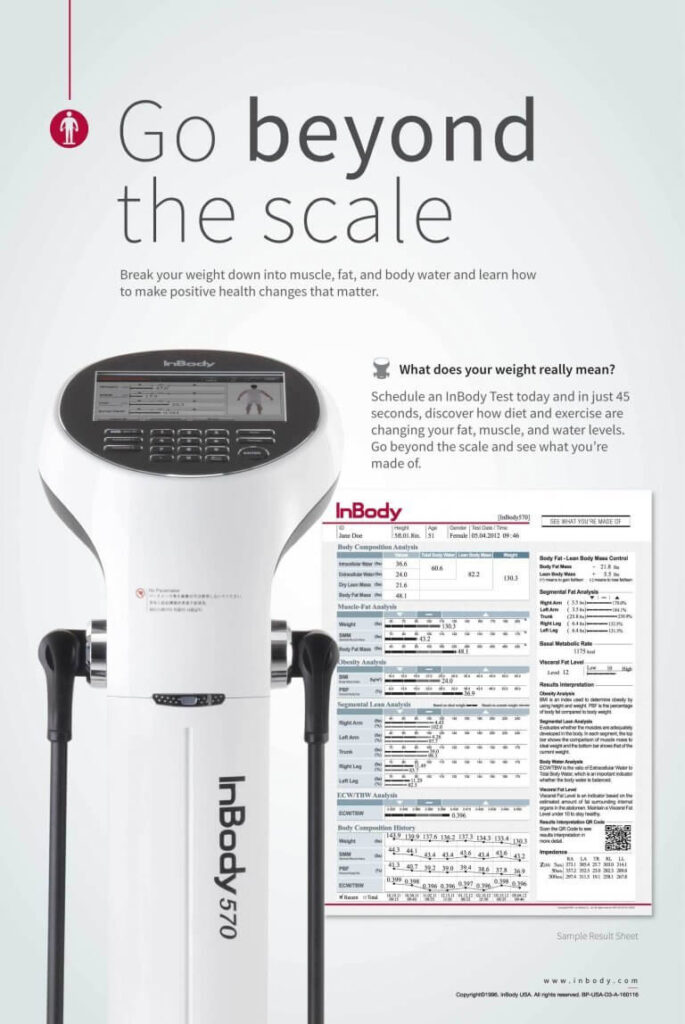What is Body Composition?
Body composition is used by health professionals to evaluate a person’s weight by breaking it down into its core components: fat, protein, minerals, and body water. It describes your healthy weight more accurately and provides a better glimpse into your overall health than traditional methods like BMI & weight. Body composition analysis can accurately show changes in fat mass, lean muscle mass, and body fat percentage.
Why Measure Body Composition?
Your scale simply doesn’t tell you the whole story. Getting a better insight into your overall wellness starts with measuring your body composition and going beyond the number on the scale. You will know whether you need to gain more lean mass or lower body fat percentage to achieve a healthy body composition and a better level of health.
What is the InBody Test?
What does your weight really represent? When you step on a scale, you can’t see how much muscle or fat you have—all you see is a number with no context.
Go beyond the scale with the InBody Test, a non-invasive, quick, and accurate body composition analysis that provides a detailed breakdown of your weight in terms of muscle, fat, and water. Your comprehensive yet easy-to-understand measurements will display on an InBody Result Sheet in 45 seconds. No more pinching. No more dunking. Get results you can trust so you can reach your health and fitness goals with precision and actionable objectives.

Ready to take the next step with an InBody Test? Book your InBody Scan with one of our Recreate Coaches HERE!

Weight Fluctuates
No matter what you do, your weight is going to fluctuate. It fluctuates daily, from morning to night depending on what we eat and our water intake. If you are a woman, you might see fluctuations of several pounds in one month, even if your eating and fitness is consistent. If you want to use a scale to track weight loss, weigh yourself at the same time of day and track patterns. Get to know your body and rhythm and cycles it goes through.
Muscle Weighs More than Fat
Yes, a pound of muscle and a pound of fat both weigh a pound. But a pound of muscle basically takes up less room in your body than a pound of fat. You might be reducing your size and getting into better shape, but there is a chance that as you gain muscle it might make you weigh the same or more than you did before you began working out. If your body fat percentage is decreasing then your program is working!
The Scale is All-Encompassing
Not only must you think about muscle versus fat, you also must consider that the scale is weighing your total body. When you step on the scale, you’re weighing muscle, fat, organs, bones, anything you are wearing, and anything you have put into your body. If you weigh yourself at the end of a day you’ll see your weight fluctuate naturally. However, this does not mean that what you ate or drank will be converted to fat. When you weigh yourself in the morning, you’ll likely see a change.
Weight Does Not Equal a Healthy Body
The number on the scale is not always an accurate reflection of someone’s health. A person 10 or 20 pounds “overweight” might actually be healthier than someone at their ideal weight. Why? Because they could have more lean muscle and less body fat.
Body Composition Changes
Body composition is your muscle to fat ratio and it changes depending on your exercise and nutrition habits. If you have a lower body composition ratio then you have more muscle and less fat which is far more important then the number on the scale. It’s a sign of a healthy body and that’s the goal – to live a healthy lifestyle.
Clothes Tell the Truth
How your clothes fit can be one of the best ways to determine if your hard work is paying off. Dropping a size can be much more satisfying then a number on the scale. It’s also more realistic because when you have trouble zipping up your jeans, you know it’s time to take action. Don’t let that number on the scale ruin your day. It’s worth it to have an honest look at your overall body composition so you know what to do. Tracking your progress can help you get the results you want.
